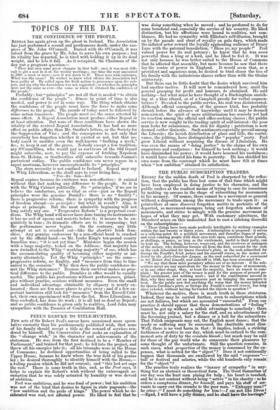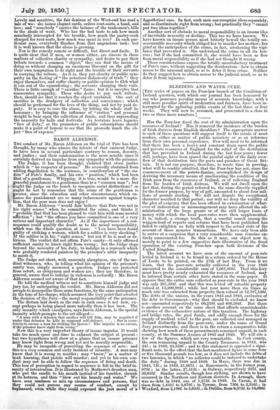THE PUBLIC SUBSCRIPTION TRADERS.
REGRET for the sudden death of Peel is sharpened by the reflec- tion, that the public has thus lost some of that time which might have been employed in doing justice to his character, and the public rushes at the readiest means of trying to ease its conscience by making up arrears in the shape of subscribing for monuments to his memory. Of course, there cannot be a movement so general without a disposition among the mercenary to trade upon it : as printsellers at once discover forgotten merits in portraits of the departed, so movement-mongers bring out forgotten schemes of monuments, and strive to mingle with the genuine movement in hopes of what they may get. With customary adroitness, the Standard seizes on this undoubted fact to cast a sidelong discredit on the subscriptions- " These things have been made perfectly intelligible by striking examples within the last twenty or thirty years. A subscription is proposed : it serves as a rallying-point for a political movement, and therefore dupes of and even cunning people with their eyes wide open, contribute their pounds, or shillings, or pollee, as long as the excitement, useful to their party, can be kept up. The feeling, however, wears out, and the receivers or managers of the money, who doubtless foresaw all from the first, account for the cash as the cash subscribed for Queen Caroline's plate, as the cash subscribed for George the Fourth's Irish palace and his emerald oroton, as the money col- lected by the Anti-Corn-law League, as the cash subscribed for a monument to Sir _Robert Peel himself, and collecteW in 1846, has been accounted for. "We say that these mere pecnniury affairs are of no interest : if the sub- scribers never see any equivalent for the money in the shape of monument, or in any other shape they, at least the majority, have no reason to com- plain; the greater part of the money is paid for the purpose of present po- litical excitement, and nothing more ; and if the contributors succeed in that, why they must act an ungenerous part in bringing the managers to book. Do the public now feel anything the worse that the money intended for Queen Caroline's plate, or George the Fourth's emerald crown, has long since exhaled, without having forwarded the objects in question ? "
Whatever the motive, there is much truth in these strictures. Indeed, they may be carried further, even to subscriptions which are not failures, but which are accounted " successfuL" From our practice it should appear that these demonstrations of "feeling" cannot be got up without a selfish advantage to somebody : there must be, not only a salary for the staff, and an advertisement for the favouring journal, but a dinner or a ball for the subscribers. That Polish emigrants may eat, the English must dance ; that the needy or suffering may be succoured, the charitable must dine. Well, there is no vast harm in that: it implies, indeed, a striking feebleness of motive in our day, which must be enticed to the com- monest acts of duty by the crustula blandi ; but much may be said for those of the gay world who do consecrate their pleasures by some thought of the unfortunate. Still the question remains, in such cases, what proportion of the money is consumed by the ex- penses, what is netted for the "object"? Does it not continually happen that thousands are swallowed by the said " expenses "— ball or festival and salaries, while the odd hundreds only remain for the " object " ? The practice truly realizes the "luxury of sympathy " in any- thing but an abstract or theoretical form. The Good Samaritan of our day sees the hurt man pining for help ; his heart is touched, i
and he s not content without being " active " in his charity : so he orders a sumptuous dinner, for himself, and pays his staff of ser- vants to carryout the crumbs to the poor man. " Unhappy man!" he cries--: ' I must do something for him !—I am not like Dives ! —Egad, I will have a jolly dinner, and he shall have the leavings."
Lovely and sensitive, the fair denizen of the West-end has read a tale of wo : she issues elegant cards, orders rout-seats, a band, and ices; and "somebody " carries the balance of the tradesmen's bills to the abode of want. Who has the bad taste to ask how much somebody- intercepted for his trouble, how much the pastry-cook charged for rout-seats, how much was spent in ices? In each par- ticular ease everybody flinches from that ungracious task ; but it is well known that the abuse is growing.
Nor is the remedy remote or difficult, but direct and facile. It Is quite clear that if men, or women either, are sincere in these matters of collective charity or sympathy, and desire to pay their tribute towards a common "object,' they can find the means of doing so without charging an enormous discount on the gift for their own temptation to do right and the trouble of their servants in carrying the tribute. As it is, they put charity or public sym- pathy on the footing of "the notorious dishonesty of trade ": they enjoy themselves, and suffer charity or public opinion to filch what it can out of the squandering ; the servants charging their veils. There is little enough of " sacrifice " there ; but it is sacnyree that consecrates sympathy.. Those who desire to pay such tribute, then should see that it reaches the object unabated. One sort of sacrifice is the drudgery of collection and conveyance ; which should be performed for the love of the thing, and not by paid de- puty. It is easy to cure the abuse, by letting the whole staff be honorary; by bringing the influence of " station " and personal weight to bear upon the collection of funds, and thus superseding the necessity for balls and festivals. As testators leave legacies "free of duty," so the promoters of public subscriptions should make it a point of honour to see that the proceeds reach the ob- ject "free of expense."



























 Previous page
Previous page